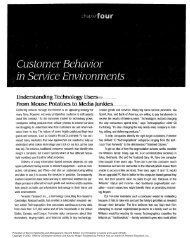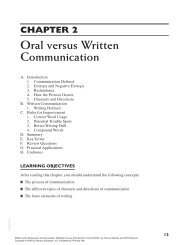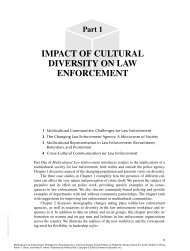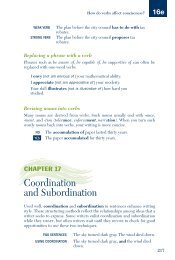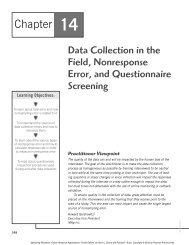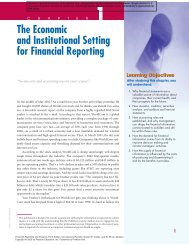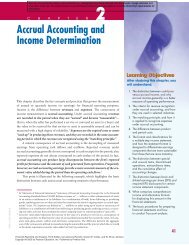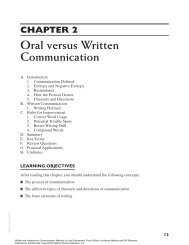MANAGEMENT COMMUNICATION - Pearson Learning Solutions
MANAGEMENT COMMUNICATION - Pearson Learning Solutions
MANAGEMENT COMMUNICATION - Pearson Learning Solutions
You also want an ePaper? Increase the reach of your titles
YUMPU automatically turns print PDFs into web optimized ePapers that Google loves.
Chapter 3 ● Communication Ethics 69Ethical leadership also extends from those managers to their frontline supervisors. Dayto day, these supervisors are responsible for setting examples and assisting those who workfor them. Others in an organization will watch what you do, and if you’re in a position ofleadership or responsibility, an ethical obligation accompanies your management duties. Ifyou let your employees know, directly or indirectly, that you condone industrial spying or thetheft of competitive marketing data, they will assume that the company approves and thatsuch acts are probably all right. The plain fact is, the moral education of those beneath youin an organization depends on your willingness to engage in and reward ethical behavior. 26APPLYING ETHICAL STANDARDS TO <strong>MANAGEMENT</strong><strong>COMMUNICATION</strong>Ethical business practice is a noble goal to which virtually all firms aspire. Many companies,however, fail to achieve this lofty ideal for a number of reasons. Increased levels of globalcompetition, financial pressures, lack of communication throughout organizations, and theabsence of moral leadership at the top levels are but a few of the most prevalent reasons. 27STATEMENTS OF ETHICAL PRINCIPLESPerhaps the most important means of establishing moral leadership in a business organization—and demonstrating that leadership to employees, customers, clients, competitors, and the worldat large—is through a formal statement of ethical principles. Developing and publishing acorporate statement of ethics certainly will not, by itself, make a company ethical, but it iscertainly a good first step. To the question of why a company should have such a statement,Professor Patrick E. Murphy offers this response:First, and most important, ethics statements denote the seriousness with which theorganization takes its ethical commitments. Words are empty without some documentation.The written statement then serves as a foundation from which ethicalbehavior can be built. Corporate culture is often viewed as being more importantthan policies in setting the ethical climate for any organization. However, writtenethical principles send a strong signal that ethics matters to the firm. 28Once an organization’s size, according to Murphy, goes beyond a handful of employeeswho interact regularly face to face, it becomes difficult to convey a sense of an organization’sprinciples and values. An ethics statement makes expectations more concrete. Furthermore,developing such a document forces those engaged in the process, whether they be the founderor current management, to articulate their beliefs in a cohesive fashion and then set themdown in writing for possible challenge by others. 29000200010270582216TYPES OF ETHICAL STATEMENTS Although ethics statements can be classified into severaltypes, three appear to predominate. They include values statements, corporate credos (or setsof basic beliefs), and corporate codes of ethics.The most prevalent form in which ethical principles are stated in U.S.-based corporations isa code of ethics. More than 90 percent of large organizations have one. At least half of those samecompanies also have a values statement. A corporate credo appears to exist in about one-third ofall large U.S.-based firms. Interestingly, while fewer firms seem to have a corporate credo, manyManagement Communication: A Case-Analysis Approach, Fourth Edition, by James S. O'Rourke, IV. Published by Prentice Hall. Copyright © 2010 by <strong>Pearson</strong> Education, Inc.



